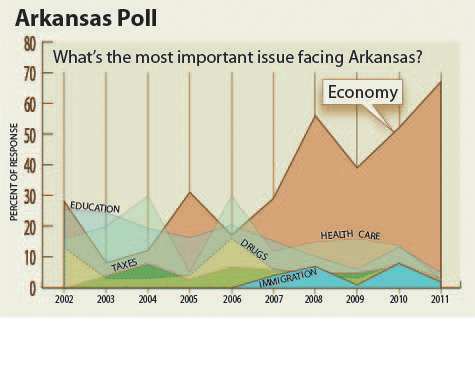FAYETTEVILLE, Ark. – While the 13th annual Arkansas Poll finds the state’s residents more concerned about the economy than ever, 74 percent of respondents expressed optimism about the direction of the state. Approval ratings of public officials were mixed heading into an election year.
“We’re seeing concern about the economy at the highest levels by far in the 13-year history of the Arkansas Poll,” said Janine Parry, professor of political science at the University of Arkansas. “The economy has led the list of problems for Arkansans since the 2007 poll, but this year’s results were striking. Fully 67 percent of all respondents and 70 percent of the ‘very likely’ voters named the economy the most important issue facing Arkansas.”
Other issues, such as education, health care and drugs, were named most pressing by 5 percent or fewer respondents. Taxes were cited as the most important issue by only 3 percent of respondents. Even in the face of unease about the economy, 63 percent of all respondents and 65 percent of ‘very likely’ voters favored a state bond issue, based on revenue from existing fuel taxes, to support improvements to interstate highways in Arkansas.
Arkansas Gov. Mike Beebe continued to receive high ratings with 72 percent of respondents approving of how he handles his job. Approval ratings for the state’s U.S. senators, John Boozman and Mark Pryor, held close to 2010 levels. Of ‘very likely’ voters, 44 percent approved of Boozman’s performance, and 48 percent approved of how Pryor handles his job.
Among ‘very likely’ voters in Arkansas, 31 percent continue to approve of Barack Obama’s performance as president, the same as in 2010, while the disapproval rating moved from 62 to 64 percent. His approval rating among ‘very likely’ Democratic voters was 63 percent, compared to only 7 percent among Republicans and 22 percent among Independents.
While support for Obama was stronger among Arkansans whose financial situation was the same or better than last year over respondents who had lost ground, those with a lower household income were more likely to approve of his performance than those with a higher income. Of respondents who reported a household income of $50,000 or less, 34 percent approved of Obama’s performance, compared with 26 percent of respondents with higher incomes.
 Janine Parry, professor of political science, University of Arkansas |
This is the second year the Arkansas Poll results suggest a move away from Democratic Party identification and toward either the GOP or no affiliation, in contrast to the stability seen for the preceding 10 years. Still, with the presidential primaries pending, this year’s poll found small gains by both Republicans and Democrats. At the same time, a significant percentage of ‘very likely’ voters migrated out of the Independent column: 41 percent of ‘very likely’ voters called themselves Independent in 2010, and the total fell to 31 percent this year.
“There’s simply a lot of volatility in partisan identification among Arkansans right now,” Parry said. “Both parties’ affiliates have returned to relatively normal levels, but independents remain rightward-leaning, which is likely to again advantage Republican candidates in 2012.”
In this year’s poll, Parry teamed up with political scientists at Elon University in North Carolina and the University of Washington on an experiment to better understand attitudes toward female politicians, comparing areas that have high, medium and low participation of women in elected office. They are sharing questions in their respective statewide polls and will be working with the resulting data over the coming months.
Methodology and Sample Information
The 2011 Arkansas Poll was conducted by Eastern Research Services. Between Oct. 14 and 19, interviewers completed 800 telephone surveys among a random sample of adult Arkansans. Twenty percent of all respondents spoke with the center’s interviewers via cell phone. Nearly 2 percent of the interviews were conducted in Spanish.
The survey’s margin of error statewide is plus or minus 3.5 percentage points, meaning that researchers are 95 percent confident that the actual result lies within 3.5 percentage points in either direction of the result the poll’s sample produced.
To assess the representativeness of the sample drawn for the poll, the Arkansas Poll team publishes what most polling organizations do not, a comparison of survey respondents’ key demographic characteristics to those of the state as a whole. This information is available on the poll website. A full summary report of the 2011 poll results and data from past Arkansas Polls will be available at 6:30 a.m. Wednesday, Oct. 26, at the Arkansas Poll website.
The 2011 Arkansas Poll was sponsored by the Diane D. Blair Center of Southern Politics and Society at the University of Arkansas, Todd Shields, director. The poll was designed and analyzed by Parry and Bill Schreckhise, associate professor in the department of political science in the J. William Fulbright College of Arts and Sciences.
Contacts
Janine Parry, professor, political science
J. William Fulbright College of Arts and Sciences
479-575-6439,
Barbara Jaquish, science and research communications officer
University Relations
479-575-2683,
